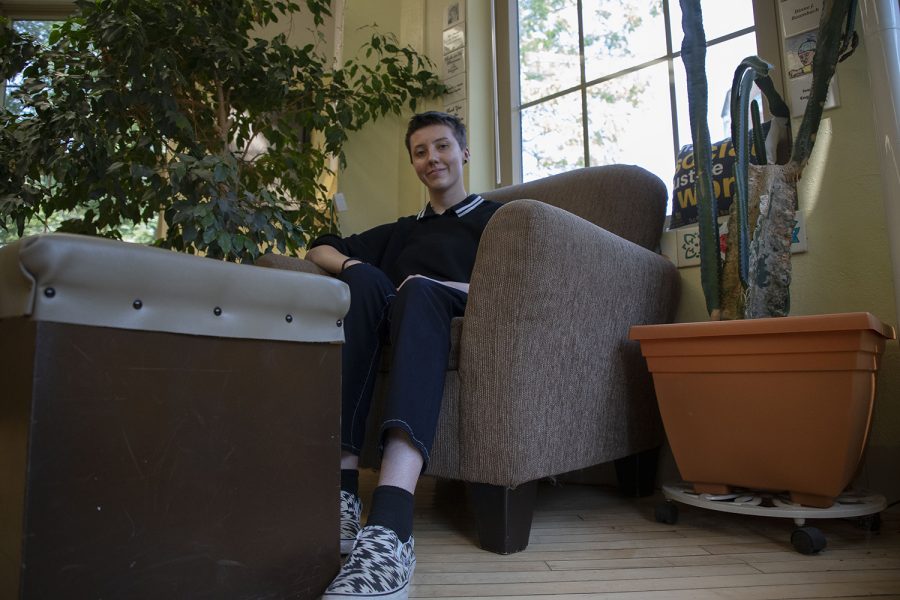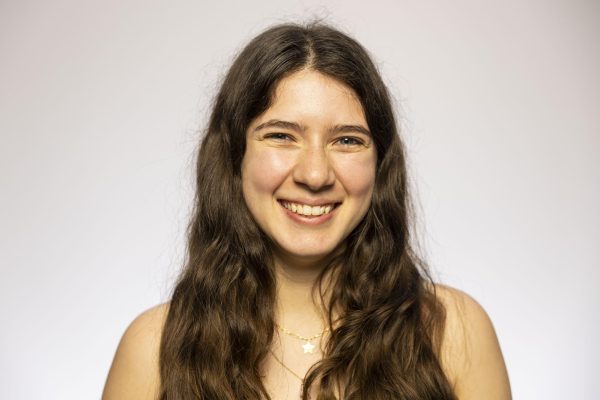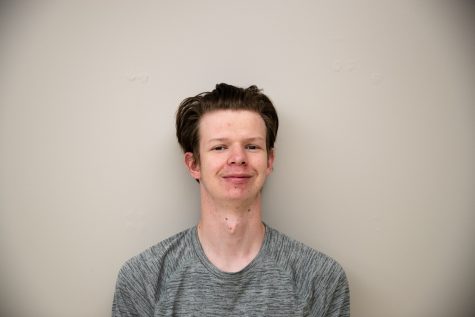UI students advocate for physical space for students with disabilities
With no meeting place of their own, UI Students for Disability Advocacy and Awareness President Abbie Steuhm is pushing for a designated space for disabled students and allies.
UISDAA president Abbie Steuhm poses for a portrait inside of Wild Bill’s Coffee Shop in school of social work on Sept. 8, 2022. Wild Bill’s Coffee Shop is a place that offers a space for students with disabilities.
September 12, 2022
University of Iowa students are pushing to add more spaces and services for students with disabilities.
With students requesting accommodations every year, students with disabilities are an active group at the UI.
Abbie Steuhm, president of UI Students for Disability Advocacy and Awareness organization, said the group has weekly meetings that anyone, whether they have a disability or identifies as an ally, can attend.
Meetings are reserved at Wild Bill’s space in North Hall.
“We just have to be quick on it, to be able to secure it,” Steuhm said. “It’s first come first serve, so we don’t really have anything unless we schedule.”
Steuhm attended a UI Undergraduate Student Government Leadership Roundtable meeting on Aug. 30 where he discussed the idea of creating a space, like a disabilities cultural house, with UI President Barbara Wilson.
RELATED: UI student creates adaptive challenge course for people with disabilities
At the meeting, Steuhm was told a house would not be possible for students with disabilities because of the high number of groups wanting a cultural house of their own.
UI Public Relations Officer, Chris Brewer, wrote in an email to The Daily Iowan that the university is not considering adding a house for students with disabilities at this time.
“Our hope is that in the future we can develop an intercultural center that can meet the needs of our evolving student demographics,” Brewer wrote.
Brewer wrote that at the meeting, Wilson also said the current priority is rehoming the “legacy” cultural centers already at the UI to provide space that is purpose-built for them.
The current cultural centers on campus are the Afro-American Cultural Center, the Asian Pacific American Cultural Center, Latino Native American Cultural Center, and the Pride Alliance Center.
“It was also shared with the group that our hope is that the Hubbard Park project will, indeed, include an Intercultural and Events Center that could provide affinity groups beyond the legacy cultural centers with dedicated space,” Brewer wrote. “There has not been a process determined for future space allocation.”
Despite the response from the university, Steuhm said he would not stop advocating for a space for students with disabilities on campus.
“This will be the center of their community. A place where they can feel safe, and are able to build up friendships,” he said. “As well as people who aren’t disabled, they can still access the house. They can see all the accomplishments we’ve done in our history and learn more and be able to better connect with the disabled community.”
Steuhm said he received positive responses from both students and faculty members around the creation of the space. He said the next step is to advocate among the student population, get a significant enough movement behind the room, and present the idea to Wilson again.
Natalie Kehrli, Undergraduate Student Government’s Disability constituency senator, said she supports the creation of a space for students with disabilities, house or not, and is working to create one while holding her position.
“Maybe that’s not a cultural house, because that costs a ton of money and that costs space and stuff that maybe we don’t have, but maybe it’s an LLC in the residence halls, or maybe it’s a classroom space in a building where it’s open and decorated nicely for disabled students to gather and find community with each other,” Kehrli said.
Kehrli is also looking to advocate for people with disabilities in other ways, like adding the Bionic Bus to the Transit app so students can request and track it and helping students with disabilities find apartments off-campus with accommodations.
“I am really passionate about listening to people who have different disabilities because we all had different experiences and trying to bring all those things together and make the best environment we can here on campus,” she said.
For Steuhm, the creation of a space for disabled students is not just for USDAA members, but for all students.
“We’re asking for an entire community on campus, one that has been invisible and continues to be invisible,” he said. “So, and especially with a rise of students asking for accommodations, we should kind of push forward on the space.”
















